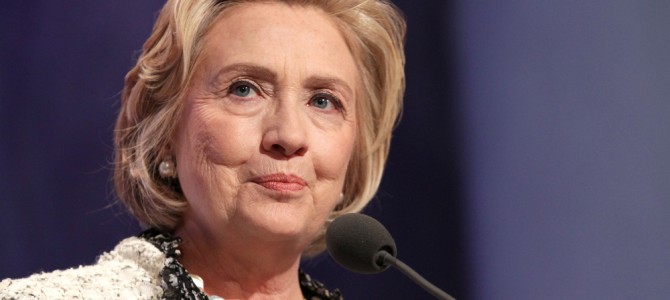
Hillary Clinton’s anti-Trump foreign policy speech the other day was one of the best I’ve seen her give in a long time. The transcript of the speech is here. The speech is largely criticizing Trump from what could be described as the internationalist center of American foreign policy – a center that prizes international stability and order. Where it hits hardest is in the portions where Clinton promises herself as a force for peace and Trump as a force for chaos.
What is most notable is how freed Clinton is from the burden faced by Republicans in the 2016 primary: they had to respect, or pretend to respect, Trump’s voters as a part of their winning coalition, and were thus forced to attack Trump while noting their sympathy for the grievances of his backers. Clinton has no such challenge: she can attack Trump as an idiot while also implying that those who agree with him are idiots without any obvious negative political ramifications. So she does.
What was particularly remarkable was the portion of the speech where Clinton attacked Trump from the right on the issue of American exceptionalism – and Trump’s apparent belief that America has not been great for a very long time: “Trump says over and over again, “The world is laughing at us.” He’s been saying this for decades, he didn’t just start this year. He bought full-page ads in newspapers across the country back in 1987, when Ronald Reagan was President, saying that America lacked a backbone and the world was – you guessed it – laughing at us. He was wrong then, and he’s wrong now – and you’ve got to wonder why somebody who fundamentally has so little confidence in America, and has felt that way for at least 30 years, wants to be our President.”
Eli Lake compares this to the 1984 remarks of Jeane Kirkpatrick.
Clinton has done to Donald Trump what Kirkpatrick did to Clinton’s party back in 1984. Clinton questioned the presumptive Republican presidential nominee’s love of country and asked why he was so nice to the dictators who hate it. It was a theme of Clinton’s major address in San Diego. ‘If Donald gets his way, they will be celebrating in the Kremlin;’ ‘I don’t understand Donald’s bizarre fascination with dictators who don’t like America;’ ‘I will leave it to the psychologists to explain his affection for tyrants,’ and so on. In most election years it is the Republicans who do this kind of thing.
Now Clinton can deploy it, and she may be able to do so effectively. It would make sense, logically… though as John Podhoretz notes, change a few lines here and there, and this could be a Marco Rubio speech. And we saw how that worked out.
“We all know the tools Donald Trump brings to the table – bragging, mocking, composing nasty tweets – I’m willing to bet he’s writing a few right now.” It is a win-win of a line, as Mollie Hemingway notes. “It’s a good line! If he doesn’t tweet anything at her, it will seem like she’s scared him into silence. If he does, she’s already pre-rebutted it.” However: “But one problem with both the media coverage of 2016’s campaign and Clinton’s response to Trump is that both seem to think that repeatedly pointing out that Trump is non-conventional and Clinton is the embodiment of conventional will help Clinton. Is there sufficient reason to think that’s the case? Or, in fact, is Trump’s complete renunciation of all political wisdom the key to his success?”
Ian Bremmer is far more skeptical about the speech, arguing that it is targeted at the political and media establishment, not the American people. I’m not so sure. The poll data cited below in response to suggestions about the rise of American populism on foreign policy issues suggests, just as those I cited yesterday about the party coalescing, that this year is more conventional than our conversations would indicate in the makeup of what American voters want from their respective parties.
It’s possible that what Clinton is really doing here is trying to stem off the one thing that could significantly elevate Trump’s chances in November: an incident of chaos. She thinks it is apparently very important to assert that when a crisis happens, she deserves the phone call, not Trump. It seems obvious how Trump will respond to that.









